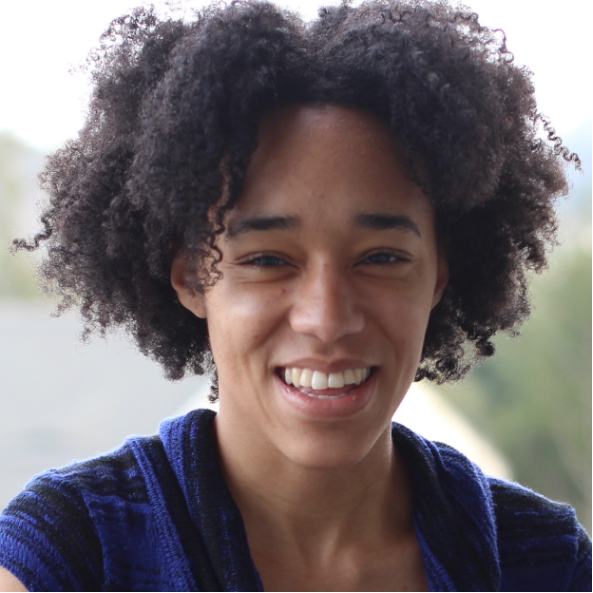Olivia Dorsey Peacock defines herself as a creative technology professional. As a family historian, she has been researching her family’s ancestry for over a decade. As a web developer, she creates family history websites and blogs.
She holds B.S. and M.S. degrees in Information Science from the University of North Carolina at Chapel Hill, with a minor in African American Studies. In 2019, she launched “Digital Black History,” a directory of Black History projects. Recently, she relaunched Franklin Memories, her family’s website. She continues to develop new digital tools to aid in Black History and Genealogical research.
Tell us about yourself. How did you become interested in the digital humanities?
I first learned about the digital humanities when I was an undergraduate at UNC Chapel Hill. I had just taken a couple of African American Studies classes and rediscovered my love for African American History. As an Information Science student, I started thinking: Is there a way I can combine my interests in technology with this history?
Taking those courses made me realize how much of my people’s history had been left out of my previous educational experiences. And it made me kind of angry, actually. I wanted to find ways to make that history more accessible to regular, everyday people who weren’t in academia. Not everyone would have the experiences that I had in college and we couldn’t rely on public schools to teach this history.
So, I started looking for classes! Many of the courses weren’t specifically labelled as “Digital Humanities,” so I had to be creative. I stepped outside of my department to learn about tools that could help me tell the stories and experiences of African Americans. I took courses to explore motion design, 3D modeling, web development, GIS, and more. One of my professors even helped me find funding to travel to the University of Maryland’s Humanities Intensive Learning and Teaching conference. I also did some internships at UNC and Duke to learn more about the field.
I see family history as a way to make history impactful and real for everyday people. This is particularly important for African American History, as Black people have been told repeatedly that we have no history. I want people to see the opposite and I want Black people to see themselves and their families in that history.
Tell us about your project, Digital Black History. How did you conceive of this project and get it off the ground?
In 2019, while researching my own family history, I considered the role of Digital Humanities projects in reconstructing and contextualizing my ancestors’ experiences. I thought about my ancestors, many of whom did not have gravestones; was there a resource out there compiling these loved ones? I quickly learned that it was difficult to find such a resource and that there were several disparate projects out there that varied in size and scope. Why weren’t these tools talking to each other? It felt like the projects I encountered existed in a silo.
I ran into other issues while searching for Black Digital Humanities projects. Even though I could use a search engine to input keywords relating to what I was looking for, I still might not find relevant results. It also didn’t seem like there was actually a centralized resource for Digital Humanities projects, let alone Black Digital Humanities projects. Certainly, other family historians could also make use of Black Digital Humanities projects. I wondered: did they even know that these projects existed?
In my search, I discovered an open Google document created by the Colored Conventions Project, which listed many Black Digital Humanities projects. But I felt that it could be improved even more. To make full use of these resources, potential users would need the ability to search for projects by location and relevant themes.
What further encouraged me to create the tool was the idea that other family historians, genealogists, students, teachers, and everyday people could benefit from it. So, I decided to go for it and create a website to be that centralized resource. I came up with a plan for the design, the database structure, and then started looking for projects to include.
What, if any, obstacles did your project face?
First, I was working full-time and could only work on the project during my spare time. And I still am! Because of this, it took me longer than I would have liked to complete it, even though the technical process was simple.
It was also difficult to find these projects and their metadata. I wanted the website to display a short summary about each project and information about who created it. But to capture this information, I had to scour these projects for it. I also had to develop appropriate keywords to associate with the projects so that users could search for them easily. Developing the keywords is a little easier now, but adding projects to the database can be quite cumbersome because I am creating this taxonomy from scratch.
I used my own funds to create the project. However, I was lucky enough to secure funding from the Seton Shields Genealogical Grant to help continue paying for hosting. I want the project to be freely available to anyone, so I will continue to rely upon my own funds and other resources to keep it online.
How has this project changed and evolved over time?
The initial concept of Digital Black History was simple. It would be a searchable directory of digital humanities projects that centered on the Black experience. These could be projects that were created by anyone; I didn’t want to limit the collection to projects created by institutions. Nor did I want to limit the projects by geography or theme. The projects just needed to be about the Black experience and capturing the history of that experience.
I also hoped that the website would help encourage a reciprocal relationship between users and the needs of these projects. Researchers would be exposed to more resources about history that could be relevant to their families and project creators would have the opportunity to share their projects and any volunteer opportunities.
Today, the project is very much inline with my initial premise, but there are a bunch of improvements I’d like to make as the directory continues to grow.
What is one project listed in Digital Black History that you are excited to feature?
There are so many amazing projects on the website. One of my favorites would be the Atlanta Funeral Programs Collection by the Digital Library of Georgia. It contains thousands of funeral home programs for individuals who had funerals in various states along the east coast. For descendants, this invaluable. You get photos, biographical information, and an understanding of relationships!
I have a particular fondness for the projects that digitize records from Black institutions, such as churches and funeral homes. These records are so important for the perspective they bring to our history and are often in danger of being lost. But for family history, they can be crucial in helping identify your people.
What’s next for Digital Black History?
In the next few months, I’ll be developing additional features to make search functionality more robust and the project entry more efficient. I’m hoping to also revisit the idea of highlighting projects that need volunteer assistance. And of course, I’ll continue to search for and add even more projects! I want Digital Black History to become a reliable resource for anyone who is interested in learning more about Black History.
Anything else you’d like to add or highlight about your work or Digital Black History? Any new projects on the horizon?
Anyone can submit a digital Black History project to Digital Black History! I’m always looking for new projects, so if there are projects you know about that aren’t on the website, just add the project to the form here and I’ll add it.
In March, I’ll be releasing episodes for the second season of my YouTube series, GenTech, which provides tutorials on technologies that can help you with your family history research journey. So, if you’re looking to learn something new, check those out and let me know what you think!
I’ve got lots of ideas, so stay tuned! For more information on my latest happenings, stop by my website, OliviaPeacock.com.
Thank you, Olivia, for generously taking the time to answer these interview questions. This interview was conducted by Natalie Ornat, Humanities Librarian at UNC Charlotte.

